Exclusive! Director Aparna Malladi: With Pellikuturu Party, I tell the world how girls can have way more fun than boys on a road trip
The filmmaker takes us through how she brought alive the story of a bachelorette trip onto the screen with a hilarious twist
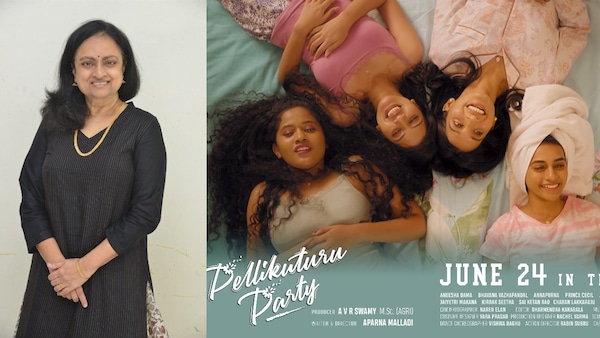
Last Updated: 10.35 AM, Jun 23, 2022
Very few in Telugu cinema capture female camaraderie in all its depth as well as Aparna Malladi. Both her mainstream Telugu projects, The Anushree Experiments and Posh Poris brought forth a funny, wacky side to femininity that’s realistic and was still very much within the mainstream space. She’s back in action to tell the story of another girl gang, Pellikuturu Party, of a wild bachelorette trip filled with adventure, unexpected twists and turns.
Ahead of the film’s release on June 24, she engages in a chat with OTTplay.com.
How do you sustain the enthusiasm in making a film out of a story you had written many years ago? Pellikuturu Party is a film you’ve been trying to make for four-five years at least...
Early on, I realised the nature of the business and that the gestation period from the concept to the screen would take long. When you try to make a film, you keep pushing for it; you don’t know which of them will find a producer. While pushing Pellikuturu Party, I was simultaneously working on multiple projects.
Every day you get up, check the status of a project, whom to call, what to do, check if it needs redrafting and hope all of them get on screen finally. Even if you’re famous, one can’t escape these delays. Every film has its timing, you can’t push it too hard and it’ll only happen when it has to. When it’s time, you need to tighten your belt and make it happen. You need to get into form when the producer says okay in any given situation.
Your perspective about your scripts evolves from time to time and the little upgrades you do to them can make or break a film. How do arrive at those creative decisions?
Sometimes, a script comes out whole and all you need to do is minor tweaking before you put it out onto the screen. You do know when the characters are fully rounded and are good to go for shoot. Some stories come in bits and pieces and the meat gets added over the years.
You need to leave certain scripts aside for some time, experience life, evolve as a person and look back at it in a newer light. You need to zoom out, have a drink with friends, watch a movie and you’ll find the breakthrough. It may take 3 or 10 drafts, but as a writer, you know when you’re good to go.
Pellikuturu Party is a story about a girl who kisses her sister’s bridegroom and goes on a bachelorette trip later. While dealing with an unusual premise like this, how do you realise if you’ve kept the wackiness quotient in it under control and not gone overboard?
Well, the premise can’t get wackier than the writer, you know! As a writer, how much ever wacky it is, it can’t go beyond my imagination. The situations in Pellikuturu Party can be wacky but the way people talk or behave is set very much in the realistic zone. I will not defy the laws of gravity; cars won’t fly and the men and women will behave the way that’s expected of them.
I am not going to change the rules. And as wacky as it may sound, it is very much possible for a girl to kiss a man on a rebound and he could very well be her elder sister’s bridegroom. The girl in the film is equally traditional when she feels that her sister can’t marry the man she has just kissed. The bachelorette trip is an excuse for her to absolve herself from this guilt and to make her sister fall in love with another man.
It’s another matter that the trip turns out to be the ride of a lifetime for everyone involved with it. When I make a film titled Pellikuturu Party, I better tell the world that girls can have way more fun than boys can. When I am getting a few crores to tell how wild a bachelorette trip can get, I better make it well. I want it to become a reference (laughs).
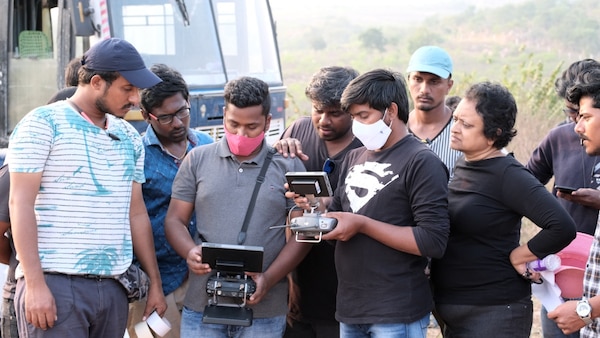
How do you ensure an emotional centre in a film of this nature? It’s after all necessary for an average viewer to resonate with it…
I always plot my stories across multiple acts and ready a framework of sorts but the core is always driven by a strong emotion. Whatever happens within this framework is dictated by the character and their emotional journey. You can have all the fun in the world, and go clubbing but every such action in the story is dictated by emotion and letting the character evolve. We all do things for emotional reasons regardless of how much we discuss logic. It’s because we’re humans.
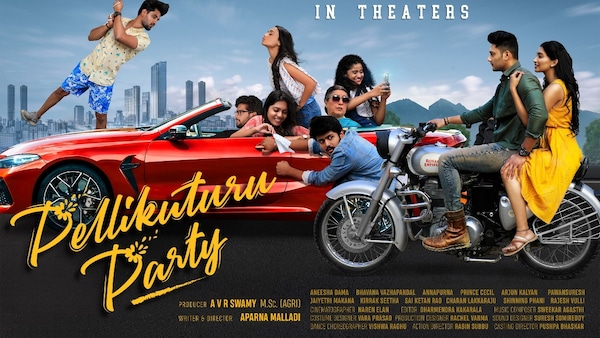
Pellikuturu Party is a story about a bunch of 20-year-olds having a gala time. Do you rely on personal experiences back in your 20s as a reference to showcase their behaviour? If yes, how do you give it a modern-day topping?
I’ve been a 20-year-old myself and I have a fair idea of what drives one’s actions at that age. Yes, of course, it’s a distant memory. If I depict the times when I was in my 20s, of course, the film would look dated. The motivation behind the actions of the 20-year-olds doesn’t exactly change with time but the filmmaking vocabulary needs to be very today in its appeal.
Most of the people I hang out with are girls in their 20s. I like their company, I don’t do that merely for research and get along very well with them. They tell me about their Tinder experiences, relationships, and life experiences and such observations blend into my characters effortlessly. Hence, it doesn’t look dated on screen.
I feel most of the observations of the younger generation are similar to mine and maybe, I was far ahead of time then (i.e. in my 20s). It’s now, in 2022 that I feel very comfortable but it wasn’t the same during my time. Growing up in the 90s was painful, I was misunderstood, and felt like fish out of water. My body may have become old today but I think I’ve met my true generation only now.
You’ve spent an equal amount of time in India and US. Could you elaborate on how this cultural blend has influenced your writing/filmmaking?
I am who I’m - a mixture of India and the US, I’m not even sure of the proportions. And yes, I’ve lived half of my life in India and the US and I’m well-travelled, and have seen the world. However, I’ve acquired all my film knowledge in the US, where I was introduced to world cinema and all the cinematic language I know today was constructed by teachers in LA.
However, the stories that I tell about Indian girl(s) in contemporary time comes from my roots here. The vocabulary with which I’m depicting them on the screen is very western. This makes it an interesting blend. As much as I tell you a story of a contemporary Indian girl, we are a traditional lot in terms of thinking.
We may talk Gucci, Prada, or go clubbing but know how to behave in Tirupathi. India is a country with a living past. Things that have been done a century ago are still being practised today - we see women wearing saris, and bindis and also have girls sporting mini skirts. We co-exist with our past.
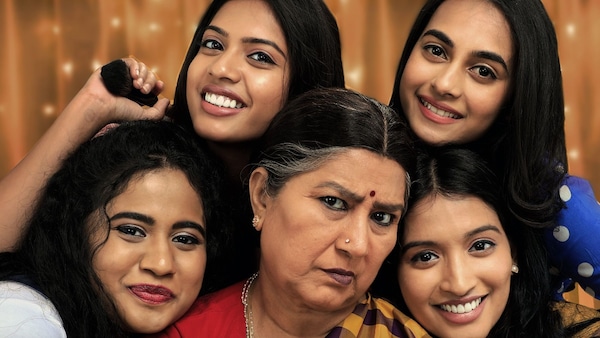
How did the idea of making grandma an integral part of the journey come about? It’s not something you see in every road film…
I think that’s a bit of feminism in me talking. I believe a woman is a seductress all her life and we stop seeing her that way as she becomes a mother or a grandmother. The absence of any romance or sexual identity to her in the later years of her life is sad, more often than not. Also, the grandma anchors the performance of the other actors in Pellikuturu Party.
As the film progresses, you realise how youthful the grandma is, probably even more than the girls around her. I think Annapurnamma garu did a terrific job of bringing that characteristic out on screen much beyond the script. I also wrote her in such a way that it is the grandma’s DNA that the girls in the family have inherited. The grandma depicts all or most of the granddaughters' traits in her. She is an amalgamation of all the four, or let’s say the granddaughters are an extension of her personality.
While you may ideate many funny situations among the girls within the script, how do you exactly make actors have ‘fun’ on the screen?
They always say ‘play comedy straight’. One needn’t try too hard to be funny on screen when comedy is inherent in the writing itself. That’s what Charlie Chaplin did on screen, all he did was enact the scene with as much honesty as he could. We are laughing because of his honesty. To keep the mood in the film vibrant and effervescent, the shoot has to become a mini-party of sorts and be a picnic.
When the actors feel that warmth, the lightness comes through in front of the camera. I kept the vibe of the set very lighthearted; you could call it a vanabhojanam. Even in some of the harder terrains like the Ethipothala falls, the actors went the extra mile to do their jobs because they were having a good time. You can tell if a film is made with a lot of effort or if it was made effortlessly. Anything in life, even this conversation or cooking, isn’t right if it isn’t effortless.
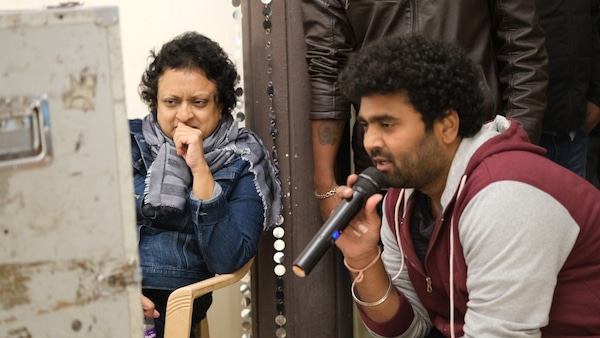
Did you think the composer Sweekar Agasthi enjoyed the Pellikuturu Party experience more because it helped him come out of the ‘small town specialist’ stereotype?
It’s actually not a major departure for him. Even though he did C/O Kancharapalem, I’ve listened to his music beyond his films and am well aware of the music he could produce. He can do pop, jazz and is a very modern composer in every sense. I didn’t think Pellikuturu Party was a stretch for him. He was waiting for something like this.
Interestingly, he was composing for both of his urban films - Stand Up Rahul and Pellikuturu Party - at the same time. The pyjama song has a mix of K-Pop influences and rap. The promotional song was an all-out jazz song and he did a fabulous job. The other song, Vennela, is a slightly traditional number but still very modern in its orchestration that captures the beauty of love across all ages.
On a parting note...
I got quality technicians as good as any big-budget film, our action and dance choreographers were keen to work in a different film like ours. The jazz song was recorded in one shot, Raghu master hadn’t done anything similar before. He managed it within three takes, there were closeups, the lighting was unique and everyone in the team was so much in sync with one another.
The actors were so enthusiastic to try something different and this is what they live for, that’s why they haven’t taken up 9-5 jobs and are acting in films. Everybody got what they wanted. I felt the cast gave a little more than their 100%, I could sense it. They came rehearsed to set and stayed in character every morning. Prince was a dream to work with and people need to go beyond his good looks. He’s a good and a good-looking actor at the same time.
(Pellikuturu Party starring Prince Cecil, Annapurnamma, Arjun Kalyan, Aneesha Dama, Bavana Vazhapandla, Kirrak Seeta, Jayatri Makana, Pavan Suresh, Saiketan Rao, Charan Lakkaraju, Shining Phani, Rajesh Villu in key roles, is written and directed by Aparna Malladi and produced by A V R Swamy)
Subscribe to our newsletter for top content, delivered fast.

